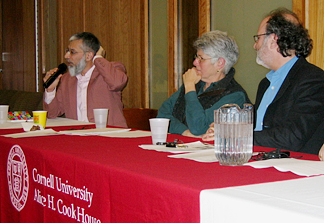Free speech or religious offense? Panel ponders difficult questions raised by Danish cartoons
By Sandra Holley

If a Danish newspaper doesn't have the freedom to publish cartoons depicting Muhammad, should the TV cartoon show "South Park" also not be free to satirize Mormons?
That was the question posed by Michael Shapiro, associate professor of communication at Cornell, in a panel discussion last week (Feb. 21) at the Alice Cook House on campus.
Shapiro and four other Cornell faculty members tried to shed light on the controversy and subsequent violence that erupted following the publication of several cartoons in the Danish newspaper Jyllands-Posten satirizing the prophet Muhammad. The discussion was held to explore "The Danish Cartoons and Their Aftermath: Religious Sensitivity Versus Freedom of Press?" and was featured as part of Islam Awareness Week.
Although the cartoons were published in September 2005, the protests by Muslims did not begin until weeks later and do not appear to be subsiding, the panelists noted.
"Last week when we were desperately putting this [panel discussion] together, there was some concern that by this week, the whole thing could have quickly blown over. Some of us said that this was unlikely to happen," stated Ross Brann, chair of Cornell's Department of Near Eastern Studies and Cook House professor and dean. "Unfortunately, those that said this were correct."
Panelist Ifikhar Dadi, assistant professor of history of art, added, "The cartoon depicts the founder of Islam, the prophet Muhammad, with a bomb in his turban. And this suggests that all of Islam, from its very founding moment, is inherently in view with terrorism and violence."
However, Brann said, all hope is not entirely lost. Four months after the publication, the editors of the Danish newspaper apologized to Muslims for giving offense in publishing the cartoons.
Shapiro agreed that the cartoons question to what extent freedom of speech encroaches on religious sensitivity. On the one side, there are the "free speech absolutists" and on the other side, people who believe that speech has an impact and can hurt people.
Free speech absolutists argue that the best way to protect everyone, including minorities, is to have no restrictions governing speech, and those who want to protest have the freedom to do so. Shelley Feldman, professor of development sociology, agreed that although the press in democratic countries has considerable freedom to print what it chooses, journalists need to consider if what they publish is in "bad taste."
However, Shawkat Toorawa, professor of Near Eastern studies, said that the Danish cartoon controversy has brought forth other issues, many of which are extremely political. These include: What is the cause of the ongoing fury that has erupted in response to the Danish cartoons? Is this really a debate over speech rights?
The view of many Muslims, he said, is that the controversy is not a question of free speech, but a purposeful violation of the tenets of their religion. Also, most of the cartoons were negative and published with the intent to inflame controversy, he insisted.
But, Shapiro pointed out that other religiously insensitive material in the media has included the many slanderous cartoons depicting Jews in Nazi Germany and Andres Serrano's art exhibit, "Piss Christ," which featured a crucifix soaking in a jar of urine. And a recent episode of the cartoon show "South Park" satirized the story of Joseph Smith and the origins of the Book of Mormon.
"So, where do we draw the line?" questioned Shapiro. "At South Park?"
Sandra Holley is a writer intern at the Cornell News Service.
Media Contact
Get Cornell news delivered right to your inbox.
Subscribe